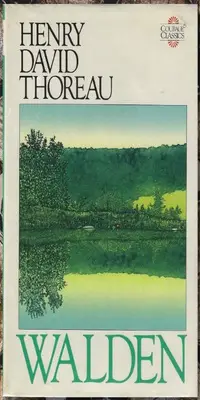Walden : Summary, Plot, Characters, Literary Analysis & More
“Walden” is a classic work of American literature penned by the renowned author Henry David Thoreau, first published in 1854. This transcendentalist masterpiece is not a conventional novel but rather a reflection on simple living in natural surroundings.
Thoreau’s “Walden” has endured as one of his greatest critical and popular successes. In this book, Thoreau chronicles his two-year sojourn in a small cabin near Walden Pond, where he explores the virtues of self-reliance and the beauty of nature.
“Walden” delves into various themes, including the individual’s relationship with society, the importance of self-discovery, and the quest for a meaningful existence.
Thoreau’s exploration of these themes through his own experiences in the woods offers profound insights into social class, human worth, and the pursuit of a more meaningful life.
Thoreau’s poetic prose and philosophical musings continue to captivate readers, making “Walden” a timeless masterpiece of American literature.

"Walden" is a reflection on simple living in natural surroundings written by American transcendentalist author Henry David Thoreau.
Table of Contents
Summary The Plot Characters Key Themes Genres Language used Literary devices Summing upThe Plot
In “Walden” by Henry David Thoreau, the author embarks on a transformative journey to live a deliberate and simple life. Thoreau describes his two-year stay in a small cabin near Walden Pond, seeking to distill life to its essence.
Influenced by his friend and mentor, Ralph Waldo Emerson, Thoreau delves into the depths of the natural world, connecting with the spiritual aspects of existence.
Throughout the book, Thoreau spends his days in communion with nature, observing its rhythms and reflecting on the human condition. He encourages readers to embrace a life of purpose and contemplation, free from the trappings of materialism and societal expectations.
Thoreau expresses the idea that many people lead lives of quiet desperation, caught in the pursuit of wealth and status.
As he immerses himself in the simplicity of Walden Pond, Thoreau’s musings offer a profound exploration of the human spirit and the quest for a more meaningful and authentic life.
Characters
The characters in “Walden” by Henry David Thoreau, though not explicitly named, play significant roles in the narrative. One character, closely associated with Ralph Waldo Emerson, embodies the philosophy of simple and spiritual living, influencing the protagonist’s journey.
Thoreau himself is the central character, his experiences and reflections driving the exploration of themes like self-reliance and the human condition. Their collective impact shapes the book’s philosophical depth.
Henry David Thoreau
As the author and central figure of “Walden,” Thoreau immerses himself in the tranquil solitude of Walden Pond to document his experiment in simple living. Throughout the book, he reflects deeply on the natural world, the human condition, and the pursuit of a meaningful life, sharing his personal experiences and profound philosophical insights that continue to resonate with readers today.
Ralph Waldo Emerson
Thoreau’s mentor and a prominent philosopher, Ralph Waldo Emerson, played a pivotal role in shaping Thoreau’s worldview. Emerson’s transcendentalist ideas on self-reliance and the interconnectedness of nature deeply influenced Thoreau’s decision to live deliberately at Walden Pond. Their close friendship and intellectual exchange are evident in the book’s philosophical underpinnings.
Various Concord Residents
While not individually named or extensively described, the residents of Concord, Massachusetts, serve as a backdrop to Thoreau’s reflections in “Walden.” Thoreau observes their lifestyles, routines, and values, using their presence to contrast with his own simple and contemplative existence, prompting readers to contemplate societal norms and the pursuit of a life in harmony with nature.
Key Themes
“Walden” by Henry David Thoreau explores various profound themes, encompassing self-reliance, the human condition, nature’s beauty, and societal norms. Through vivid prose and personal reflection, Thoreau delves into these themes, encouraging readers to contemplate their own lives and values.
Self-Reliance
Thoreau emphasizes the importance of self-reliance, advocating for individual autonomy and the pursuit of a simpler, more meaningful life, free from materialism.
Nature’s Beauty
The book celebrates the beauty and wisdom of the natural world, as Thoreau immerses himself in the tranquility of Walden Pond, highlighting the restorative power of nature.
Human Condition
Thoreau reflects on the complexities of the human condition, exploring themes of existentialism and the quest for a purposeful existence beyond the “quiet desperation” of societal norms.
Societal Norms
Thoreau critiques societal norms and materialistic pursuits, challenging readers to question their own values and consider alternative paths to fulfillment and happiness.
Genres in Walden
“Walden” by Henry David Thoreau defies a singular genre, blending elements of autobiography, transcendentalist philosophy, nature writing, and social critique. This genre fusion contributes to the book’s unique narrative, allowing Thoreau to seamlessly weave his personal experiences, philosophical reflections, and observations of nature and society into a rich and thought-provoking tapestry.
Autobiography
Thoreau’s personal journey and his deliberate, two-year experiment in simple living form the core of the narrative, providing readers with insights into his own life choices and philosophical development.
Transcendentalist Philosophy
The book embodies transcendentalist ideals, emphasizing the interconnectedness of nature and the human spirit, and encouraging self-reliance and non-conformity.
Nature Writing
Thoreau’s vivid descriptions of the natural world around Walden Pond showcase his deep reverence for nature and its transformative impact on his life, adding a lyrical and sensory dimension to the narrative.
Social Critique
Thoreau critiques societal norms, materialism, and the pursuit of wealth, using his observations of the people of Concord to shed light on the complexities of human behavior and the challenges of leading a more deliberate life.
Language used in Walden
Henry David Thoreau’s writing style in “Walden” is characterized by its simplicity and transcendental eloquence. Through his prose, he invites readers into the contemplative world he inhabited during his two-year sojourn at Walden Pond.
Thoreau encourages a reevaluation of life’s priorities, emphasizing a connection to nature and a spiritual life over material pursuits.
Thoreau spent his time in Walden Pond living deliberately, and this intentionality is mirrored in his language. He discusses the beauty of simplicity, advocating for a life stripped of unnecessary distractions.
Thoreau talks of a spiritual awakening in nature, employing vivid descriptions to convey the serenity and wisdom he found by the pond.
His writing embodies the transcendentalist philosophy, focusing on the essential facts of existence. Thoreau’s prose encourages readers to seek meaning beyond the superficial, to explore the depths of a simpler, more profound life, and to find their own spiritual connection in the natural world.
Literary devices in Walden
The author skillfully employs various literary devices to enhance the narrative and convey his philosophical ideas. Thoreau discusses his experiences and reflections on life in the woods, using vivid descriptions and sensory details to immerse readers in the natural world.
He explains his transcendentalist beliefs through introspective passages, emphasizing the spiritual quest for a meaningful existence.
Thoreau tells the story of his time at Walden Pond, using anecdotal narratives to illustrate his philosophical points. He artfully uses the setting of Walden Woods as both a physical and metaphorical backdrop, symbolizing the simplicity and depth he seeks in life.
Throughout the book, Thoreau emphasizes the importance of focusing on “only the essential facts,” encouraging readers to strip away distractions and discover their own path to a more deliberate and purposeful existence.
These literary devices enrich the text, making “Walden” a compelling and enduring work of American literature.
Similes
In “Walden” by Henry David Thoreau, the author employs similes to vividly convey his experiences and philosophical ideas, enriching the reader’s understanding and engagement with the text.
Thoreau explains his connection to nature by comparing it to a spiritual communion, stating that “In the morning, I bathe my intellect in the stupendous and cosmogonal philosophy of the Bhagavad-Gita, since whose composition years of the gods have elapsed, and in comparison with which our modern world and its literature seem puny and trivial.”
Here, he uses a simile to liken the profound wisdom of the Bhagavad-Gita to a cleansing and enlightening ritual, emphasizing its significance.
Thoreau employs to help readers visualize and relate to his experiences, bridging the gap between his secluded life at Walden Pond and the broader human experience, making his transcendentalist philosophy more accessible and engaging.
Metaphors
Metaphors play a significant role in conveying deeper meanings and enriching the text. Thoreau ventures into the winter animals’ world as a metaphor for his own introspective journey. He explores the Baker Farm and Goose Pond, using them as metaphors for the human condition and societal norms.
Thoreau’s description of “brute neighbors” refers to the wild animals that share the woods with him, serving as metaphors for the untamed aspects of human nature. He likens himself to a “crank and hermit saint,” using these metaphors to highlight his pursuit of a simpler, more contemplative life.
Thoreau’s self-built cabin serves as a metaphor for his self-reliance and his ability to carve out a space in nature to contemplate universal truths. Through these metaphors, Thoreau invites readers to delve into the layers of meaning in his experiences and reflections, making “Walden” a rich and thought-provoking literary work.
Analogies
In “Walden” by Henry David Thoreau, analogies serve as powerful tools to simplify complex ideas and draw parallels between nature and human existence. For instance, Thoreau likened his experience at Walden Pond to a rebirth, where he sought a “new life” immersed in the rhythms of the natural world.
He employed the analogy of church bells to emphasize the timelessness and universality of spiritual truths, suggesting that nature’s sounds are akin to spiritual revelations.
Thoreau’s analogy of the Fitchburg Railroad as a symbol of modern society’s hustle and bustle highlights the stark contrast between the tranquility of Walden and the relentless pace of urban life.
These analogies help readers relate to and better understand the deeper philosophical concepts and the significance of Thoreau’s Walden experiment.
Imagery
Thoreau masterfully uses vivid imagery in “Walden” to immerse readers in the sensory experiences of his life in the woods. He paints a picture of Fair Haven Bay and the surrounding natural landscape, allowing readers to feel the tranquility of the pond and visualize the changing seasons.
Through imagery, he evokes the sensation of hearing church bells, creating a meditative atmosphere that connects with the book’s exploration of universal truths. Thoreau’s descriptions of animal life and the North American continent further enrich the reader’s experience by invoking a vivid sense of the diverse and abundant natural world.
This imagery deepens the reader’s connection to the text and reinforces the book’s themes of simplicity, self-discovery, and the beauty of nature.
Symbolism
“Walden” is rich with symbolic elements that connect to larger themes. Fair Haven Bay symbolizes the serene and transformative environment where Thoreau lived his Walden experiment, reflecting his quest for simplicity and self-renewal.
The church bells symbolize the timeless and universal truths that nature reveals, emphasizing the spiritual and philosophical aspects of Thoreau’s journey. The young women on the Fitchburg Railroad symbolize the distractions and societal pressures that contrast with the solitude and introspection of Walden Pond.
The North American continent symbolizes the vastness of the natural world and its potential for self-discovery. These symbols contribute to the depth and resonance of “Walden,” inviting readers to explore its themes of individualism, contemplation, and the relationship between humanity and nature.
Personification
In “Walden,” Thoreau employs personification to infuse life and character into the natural surroundings. For example, he personifies Walden Pond itself as a living entity with its own story to tell. He finds solace in its depths, portraying it as a reflective companion and confidant.
Thoreau also personifies the landscape as he builds his cabin, describing how the earth receives his foundations and the trees bend to form the roof.
These instances of personification deepen the reader’s connection to the natural world, making it a significant character in the narrative and emphasizing the symbiotic relationship between Thoreau and his environment.
Hyperbole
While “Walden” is known for its simplicity and understatement, Thoreau occasionally employs hyperbole to emphasize his points. He uses deliberate exaggeration to emphasize the profound impact of his solitary life by Walden Pond.
For instance, in the phrase “I went to the woods because I wished to live deliberately,” Thoreau hyperbolically emphasizes the radical nature of his choice to live a simpler, more intentional life. These moments of hyperbole punctuate the narrative, drawing attention to key themes and ideas.
Irony
Irony is woven throughout “Walden.” Thoreau’s decision to retreat to the woods to live a life of simplicity, while documenting it in a published book, is a form of situational irony.
Thoreau acknowledges this irony, emphasizing that he does not want to lead others down the same path but rather inspire them to find their own way.
Thoreau’s observations of the red and black ants illustrate dramatic irony, as he reflects on the futility of human wars in comparison to their tiny battles. This irony adds layers of complexity to the narrative, inviting readers to reflect on the contradictions and paradoxes of life and existence.
Juxtaposition
Juxtaposition is used to illuminate stark contrasts and provoke contemplation. Thoreau finds himself in a profound juxtaposition between the simplicity of Walden Pond and the complexities of the world beyond its shores.
As he builds his cabin, the juxtaposition of nature’s raw materials and human craftsmanship underscores the intersection of civilization and wilderness. The title itself, “Walden; or, Life in the Woods,” juxtaposes the idea of living a deliberate, introspective life in the natural world with the broader concept of existence within society.
Thoreau takes readers on a journey through these thought-provoking scenarios, encouraging them to reflect on the juxtapositions in their own lives and the tension between individuality and societal norms.
Paradox
“Walden” is rife with paradoxical statements and situations that invite readers to delve into deeper meanings. Thoreau takes a paradoxical stance by seeking simplicity in the wilderness while documenting his experiences in a published book, thus navigating the paradox of intentional solitude and sharing his insights with the world.
He feels the paradox of the former inhabitants of Walden Pond, who left traces of their existence but were themselves transient. Thoreau explores the paradox of individual self-reliance in a society that often values conformity.
These paradoxes challenge readers to confront the complexities of life and question conventional wisdom, contributing to the book’s enduring appeal and philosophical depth.
Allusion
The novel contains several literary and historical allusions that enrich the narrative. One such allusion is to the story of the white pond and its winter visitors, which alludes to the seasonal migration of birds, drawing parallels between their natural rhythms and Thoreau’s own connection to the cycles of life and nature.
Flint’s Pond, mentioned in the book, alludes to the idea of a pristine and untouched natural space. Thoreau references “higher laws,” alluding to a moral and spiritual dimension to his experiences at Walden Pond.
The passing train serves as a symbol of modernity and the disruption of nature’s tranquility, contrasting with Thoreau’s quest for simplicity. These allusions add depth and context to the story, allowing readers to draw connections between Thoreau’s experiences and broader cultural or historical references.
Allegory
While “Walden” is not a traditional allegory, it contains allegorical elements that represent broader themes and concepts. Thoreau’s house warming, for instance, symbolizes his newfound sense of self-reliance and autonomy, reflecting the broader theme of individualism.
The “iron horse” (train) symbolizes the relentless march of progress and the encroachment of modernity on the natural world, serving as an allegory for the disruption of the status quo.
Thoreau’s interactions with the poor man highlight the societal disparities and the allegorical contrast between material wealth and spiritual fulfillment.
These allegorical elements serve to underscore the book’s philosophical depth and encourage readers to contemplate the broader implications of Thoreau’s experiences at Walden Pond.
Ekphrasis
“Walden” by Henry David Thoreau doesn’t prominently feature instances of ekphrasis, where works of art are vividly described. Instead, the book’s focus is on the natural world and philosophical reflections rather than the depiction of visual art.
Thoreau’s descriptions center on the beauty of Walden Pond and its surroundings, creating a vivid picture of the landscape, but these are not works of art in the traditional sense. Thoreau’s artistry lies in his eloquent portrayal of nature and his ability to convey its significance and universal truths through words rather than visual representations.
Thus, while ekphrasis is not a prominent feature, the text itself serves as a form of literary art that invites readers to contemplate the beauty and depth of the natural world.
Onomatopoeia
The novel employs onomatopoeic words sparingly to add auditory dimensions to the narrative. Thoreau’s writing style is more focused on philosophical reflection and sensory description rather than onomatopoeic effects.
However, there are instances where he uses onomatopoeia to evoke sounds from the natural world, such as the “chickadee-dee-dee” call of the chickadee bird, which adds an auditory element to the narrative.
While not a dominant stylistic feature, these onomatopoeic words contribute to the reader’s sensory experience, enhancing the overall immersion in the natural setting of Walden Pond and its surroundings.
Thoreau’s primary focus is on the broader philosophical and contemplative aspects of his experience, making the occasional use of onomatopoeia a subtle but effective tool for engaging the reader’s senses.
Puns
“Walden” by Henry David Thoreau does not prominently feature puns as a stylistic device. Thoreau’s writing style in the book is more focused on philosophical reflection, nature description, and introspection rather than the use of wordplay or humor typically associated with puns.
The book is known for its earnest and contemplative tone, which aligns with Thoreau’s aim to convey profound ideas about simple living and the human condition.
While there may be occasional wordplay or linguistic nuances, these are not prominent features, and the book’s impact relies more on its deeper philosophical content rather than humor or double meanings.
Repetition
Thoreau utilizes repetition in “Walden” to emphasize key themes and ideas, reinforcing their significance. For example, he repeats the phrase “bean-field” to describe his neighbor John Field’s struggles, highlighting the monotony and toil of conventional work.
Repetition also appears in his descriptions of the “rain shower,” capturing the cyclical and renewing nature of natural processes. Thoreau often repeats themes and ideas in his journal entries, reinforcing his philosophical reflections.
The repetition of the phrase “half wits” underscores his critique of societal norms and the pursuit of material gain at the expense of deeper self-awareness.
Through repetition, Thoreau emphasizes the importance of self-control, inner peace, and the value of simpler, more deliberate living over the monotony of odd jobs and a frenetic pace of life.
The Use of Dialogue
In “Walden” by Henry David Thoreau, dialogue is not a prominent feature, as the book is primarily a personal reflection on Thoreau’s experiences and philosophical musings. However, Thoreau occasionally includes conversations with people like his neighbor John Field.
Through these dialogues, readers gain insight into the contrasting perspectives on work and life. Thoreau’s interactions with Field reveal Field’s materialistic outlook, highlighting the themes of simplicity and self-reliance that Thoreau champions.
While dialogue is not extensively used, these brief exchanges serve to illustrate the differences in values and lifestyles between Thoreau and the people he encounters.
Word Play
Thoreau’s writing style in “Walden” is more focused on philosophical reflection and descriptive prose than wordplay such as puns and double entendre. The book is known for its earnest and contemplative tone, where the emphasis is on conveying profound ideas about simple living and the human condition.
Thoreau’s writing is characterized by clarity and depth rather than linguistic wordplay or humor. While there may be occasional instances of wordplay or linguistic nuances, these are not prominent features in the text.
Thoreau’s impact in “Walden” comes more from his exploration of deeper philosophical content rather than playful language or double meanings.
Parallelism
“Walden” by Henry David Thoreau employs parallelism to enhance the structure and convey the book’s core message. Thoreau describes his pursuit of a simple life, emphasizing parallel experiences in nature and society.
For instance, he draws parallels between his life at Walden Pond and the routines of everyday existence in the “bean-field” and at Baker Farm. This structural parallelism highlights the stark contrast between the tranquility of nature and the busyness of societal life.
Thoreau’s use of parallelism underscores his central message of the need for deliberate and introspective living, demonstrating that the rhythms of nature offer a deeper understanding of existence than the superficial pursuits of modern society.
Rhetorical Devices
Thoreau employs rhetorical devices like rhetorical questions and parallelism to persuasive effect in “Walden.” He poses rhetorical questions that prompt readers to reflect on their own lives and choices, encouraging self-examination.
Parallelism, as mentioned earlier, emphasizes the dichotomy between his life at Walden Pond and the conventional world. These devices serve to persuade readers to consider the merits of a simpler, more purposeful existence and to question societal norms.
By skillfully using rhetorical techniques, Thoreau engages readers in his philosophical exploration and encourages them to contemplate their own values and choices in the context of the broader human experience, as depicted in the book, including his encounters with nature and figures like John Updike.
Walden : FAQs
Welcome to the FAQ section for the summary of “Walden” by Henry David Thoreau.
Here, we address common questions about the book, its themes, characters, and literary devices.
What is the main point of Walden?
The main point of “Walden” is to explore the value of simplicity, self-reliance, and a deep connection to nature as a means to lead a more meaningful and deliberate life.
What was the moral of the story for Walden?
The moral of the story in “Walden” is to encourage readers to question societal norms, embrace individuality, and seek a harmonious relationship with the natural world.
What is Thoreau’s central message in Walden?
Thoreau’s central message in “Walden” is that a life lived with purpose and authenticity comes from a deliberate and mindful existence, free from unnecessary material and social distractions.
How is Walden Pond described?
Walden Pond is described as a serene and introspective haven, a place where Thoreau finds solitude, inspiration, and a profound connection to the natural world.
What is the conclusion of Walden summary?
The conclusion of the “Walden” summary is that through deliberate living, Thoreau invites readers to seek simplicity, self-awareness, and a deeper understanding of life’s essentials in a world often consumed by superficiality and haste.
Summing up: Walden : Summary, Plot & More
“Walden” by Henry David Thoreau remains a timeless masterpiece of American literature, celebrated for its profound exploration of simplicity, self-reliance, and the human connection to nature.
Thoreau’s vivid descriptions of life at Walden Pond and his introspective musings continue to captivate readers, inviting them to contemplate the essential aspects of existence in a fast-paced and materialistic world.
The book’s enduring appeal lies in its ability to inspire self-reflection and a deeper understanding of what it means to lead a deliberate life. Thoreau’s call to strip away the superfluous and focus on the essentials resonates with those seeking meaning and authenticity in their own lives.
“Walden” is a reminder of the enduring power of nature, the importance of individualism, and the pursuit of a more purposeful existence.
As readers immerse themselves in Thoreau’s contemplative prose, they find a guiding light towards a simpler, more intentional way of living, making “Walden” a timeless source of inspiration and wisdom.
Other Notable Works by Henry David Thoreau
If you are interested in “Walden”, you may be interested in other works by Henry David Thoreau including:
- “Civil Disobedience” (also known as “Resistance to Civil Government”): In this essay, Thoreau presents his ideas on the duty of civil disobedience in the face of unjust laws and government actions. It has had a profound influence on political thought and movements for social justice.
- “A Week on the Concord and Merrimack Rivers“: Thoreau’s travel narrative and philosophical reflections during a journey with his brother on these rivers. It explores themes of nature, self-reliance, and transcendentalism.
- “The Maine Woods“: Thoreau’s account of his adventures in the wilderness of Maine, where he explores the rugged landscapes, wildlife, and encounters with Native Americans.
- “Cape Cod“: Thoreau’s travelogue describing his trips to Cape Cod, Massachusetts. It reflects his observations on the natural world and human history in this coastal region.
- “The Journal of Henry David Thoreau“: Thoreau’s extensive journal writings provide insights into his daily life, thoughts, and observations. They offer a deeper understanding of his philosophy and experiences.
These works, like “Walden,” showcase Thoreau’s keen observations of the natural world, his philosophical reflections, and his advocacy for simplicity, self-reliance, and harmonious living with nature.







